First things first: if you want to stay safe when you're using the internet – which we assume you do! – what should you be looking out for and what steps can you take to defend yourself and your PC from the havoc that malware can cause?
The best thing you can do is to familiarize yourself with the different types of malware, or unwanted programs such as foistware, as this will give you a better chance of protecting your devices from their malevolence. Take "Next Search", for example, it falls into the browser hijackers category – i.e. something that you don't want but that you probably don't realize you are downloading and installing.
What are browser hijackers?
If you're wondering why something that we just described as being forced upon you might only be potentially unwanted then you would be forgiven for being a little confused. The technology security providers, McAfee, came up with the Potentially Unwanted Program moniker as a means of describing software or applications that will probably be deemed unnecessary by most of us regular computer users.
For the most part, Next Search and similar browser hijackers have been created as a way of redirecting our internet searches away from the website we want to visit and instead to one they have been designed to send us to. Horribly annoying and, yes, definitely unwanted we probably all agree, but the fact is that because a browser hijacker is still a program with a function of some sort (i.e. a search bar) it remains only potentially unwanted. In this case, it redirects users to Bing search engine. So, Next Search doesn't use its own web search algorithms. It simply redirects user to other websites. However, you can notice an advertisement on go.next-search.net homepage which you wouldn't find on any other search engine, not to mention Google or Yahoo. So, Next Search's programmers simply want you display ads and then grab the results from other search engines or simply redirect you to other websites. The question is, do you want that? Probably not. I know I don't. However, it's up to you to decide.
Further compounding this confusion is the issue of the installation. Most malware attacks you and installs itself without you being any the wiser, but browser hijackers are a little different and that is because you have to first give your consent to download them. Never knowingly downloaded a browser hijacker and now your home page is Next Search? Are you absolutely sure you read every single word of End User License Agreements when you're downloading tools, programs or files?
Next Search programmers will argue they can't be classed as malware, no matter how pointless their product is in actuality, because they are giving you the option to download or reject. The fact that the browser hijacker will be rather ambiguously alluded to in the License Agreement is neither here nor there in the eyes of the programmer.
Next Search removal can be a tedious task. It modifies browser settings and also makes modifications to Windows registry. Hopefully, the removal guide below will help you to remove this browser hijacker from your computer. If you have any questions, please leave a comment down below. Good luck and be safe online!
Written by Michael Kaur, http://deletemalware.blogspot.com
Next Search Browser Hijacker Removal Guide:
1. First of all, download recommended anti-malware software and run a full system scan. It will detect and remove this infection from your computer. You may then follow the manual removal instructions below to remove the leftover traces of this infection. Hopefully you won't have to do that.
2. Remove Next Search related programs from your computer using the Add/Remove Programs control panel (Windows XP) or Uninstall a program control panel (Windows 7 and Windows 8).
Go to the Start Menu. Select Control Panel → Add/Remove Programs.
If you are using Windows Vista or Windows 7, select Control Panel → Uninstall a Program.

If you are using Windows 8, simply drag your mouse pointer to the right edge of the screen, select Search from the list and search for "control panel".

Or you can right-click on a bottom left hot corner (formerly known as the Start button) and select Control panel from there.
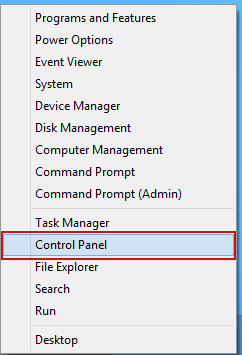
3. When the Add/Remove Programs or the Uninstall a Program screen is displayed, scroll through the list of currently installed programs and remove the following programs:
- Next Search
- Go_Next Search
- GoSave
- MassTube
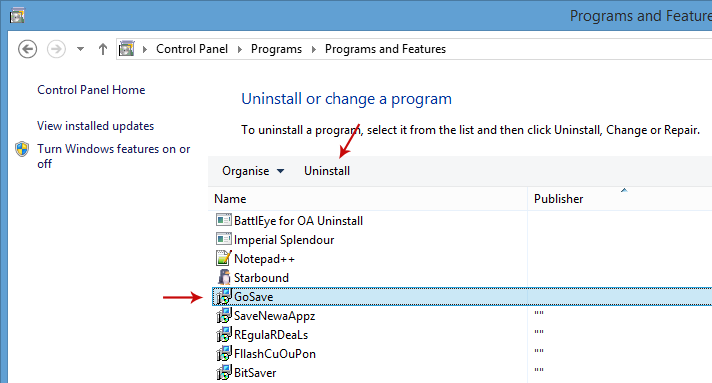
If you are using Windows Vista, Windows 7 or Windows 8, click Uninstall up near the top of that window. When you're done, please close the Control Panel screen.
Remove Next Search from Google Chrome:
1. Click on Chrome menu button. Go to Tools → Extensions.
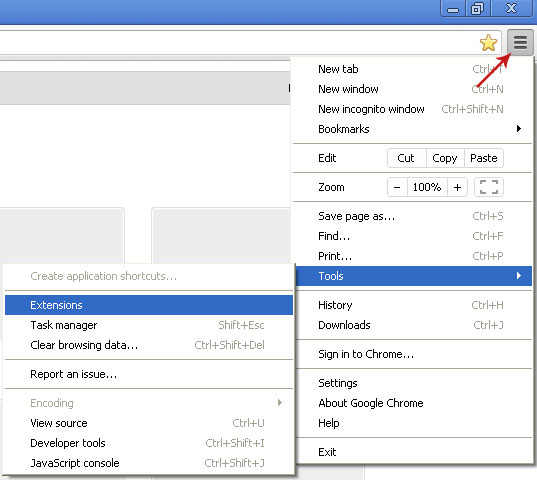
2. Click on the trashcan icon to remove Next Search, MassTube, BookmarkTube extensions.
3. Then select Settings. Scroll down the page and click Show advanced settings.
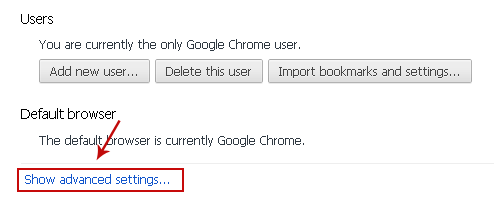
4. Find the Reset browser settings section and click Reset browser settings button.
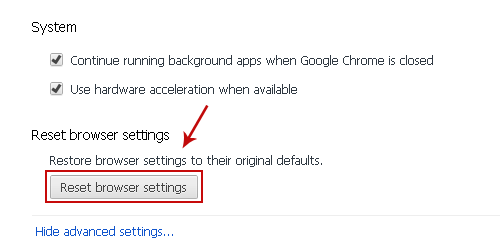
5. In the dialog that appears, click Reset.
6. Right-click Google Chrome shortcut you are using to open your web browser and select Properties.
7. Select Shortcut tab and remove "http://go.next-search.net..." from the Target field and click OK to save changes. There should be only the path to Chrome executable file.
Remove Next Search from Mozilla Firefox:
1. Open Mozilla Firefox. Go to Tools → Add-ons.

2. Select Extensions. Remove Next Search, MassTube, BookmarkTube browser extensions. Close Add-ons manger.
3. In the URL address bar, type about:config and hit Enter.
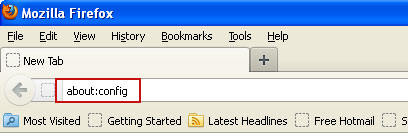
Click I'll be careful, I promise! to continue.

In the search filter at the top, type: Next Search
Now, you should see all the preferences that were changed by go.next-search.net. Right-click on the preference and select Reset to restore default value. Reset all found preferences!
4. Right-click the Mozilla Firefox shortcut you are using to open your web browser and select Properties.
5. Select Shortcut tab and remove "http://go.next-search.net...." from the Target field and click OK to save changes. There should be only the path to Firefox executable file.
Remove Next Search from Internet Explorer:
1. Open Internet Explorer. Go to Tools → Manage Add-ons.

2. Select Search Providers. First of all, choose Live Search search engine and make it your default web search provider (Set as default).
3. Select Next Search and click Remove to remove it. Close the window.
4. Right-click the Internet Explorer shortcut you are using to open your web browser and select Properties.
5. Select Shortcut tab and remove "http://go.next-search.net...." from the Target field and click OK to save changes. Basically, there should be only the path to Internet Explorer executable file.
Remove "Next Search" Browser Hijacker (Uninstall Guide)
4/
5
Oleh
soni agus


